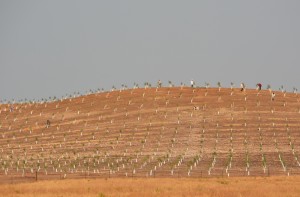
When the Lost Angeles Times’ George Skelton proposed government regulation of crops last month, his column sparked a puzzling response from Modesto Bee editors. In, “Our View: Farmers don’t need help deciding what to plant,” the Bee slammed Skelton, saying, “It [Skelton’s column] could only have been written by someone with virtually no knowledge of actual farming.”
Skelton may not be an expert on farming, but that’s irrelevant to his point. Like the rest of us, Skelton is witnessing the worst drought in a lifetime and can’t help noticing the burden of conservation is heavier on city dwellers than it is on major water users, especially those in agriculture.
A strong case in point is right here in Stanislaus County, where farmers in the eastern foothills have planted tens of thousands of acres of almond orchards solely dependent on groundwater. No one thinks farming in the foothills is sustainable with groundwater the only water source. Nonetheless, despite the drought, farmers keep planting because the only issue for them is whether there’s enough water to show a profitable return on their investment.
As Skelton points out, “We don’t allow a new housing tract to sprout unless the developer can identify a source of water.” That source must be sustainable. Today, Big Ag is far less concerned about sustainability than profitability. That’s why the same regulations should apply to farmers as apply to developers, at least as far as water is concerned.
Stanislaus County Supervisor Jim DeMartini is no friend of government regulation, but has long contended that county supervisors should prohibit rangeland conversion to permanent crops when such conversions are unsustainable.
“…relying solely on groundwater is unwise,” said DeMartini recently. “They [those relying on groundwater] are going to degrade the environment tremendously. I’m in a water district and my allotment was cut 50% this year, but they can continue pumping as much as they want. We have to learn you don’t degrade your own environment this way.”
In fact, the reason we have supervisors is to promote wise land use. It makes no sense to promote land use that exhausts public resources, but that’s exactly what happens when we allow permanent crops on land without sustainable water sources.
It’s true that farmers don’t need help deciding what to plant and also true that developers don’t need help deciding what to build. Both choose options they deem most profitable. That doesn’t mean those options always serve the public weal.
California is already overpopulated and overplanted. Absent regulation of water and land use, our ongoing tragedy of the commons can only escalate.
Bee editors seem to think that because farmers, “take risks in deciding what to plant,” they should be exempt from regulation. That might be true if the risks were only to the farmer, but when public resources are at stake, the public needs risk protection.
We now know that groundwater and surface water are inseparably connected. We also know that water is a public resource that belongs to no one entity or interest group. Large-scale farming, like large-scale development, has significant environmental impacts. The Bee asks sarcastically whether agriculture should be subject to review under the California Environmental Quality Act. We think a better question is, “Why shouldn’t it be?”

As a former large scale farmer who sold and moved to Oregon to farm with water laws that are already in place and protect both the farmer and citizen. I feel missing in the conversation is that the water the farmers use is also the water that the consumers use. This is not about the debate if the farmers are planting the best use of crops to sustain our hunger. This is the conversation about where the benefits of where the water goes.
Good point. However, with large scale nut farming, the vast majority of the “consumers” are in places like China.
Didnt read the Bee’s piece. Farmer’s cant be told what crops they should and should not grow. On the other hand, permanent crops should not be planted outside of water districts or any other place that does not a reliable source of surface water. What has happened in Oakdale is not sustainable. It is also happening on the west side. I believe there are already restrictions in place down south along the west side which restricts planting of permanent crops